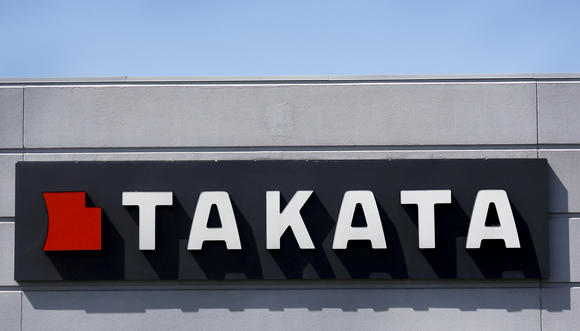Takata to pay $1bn to settle US air bag probe
Fri 13 Jan 2017, 22:10:13

Japan's Takata Corp is expected to plead guilty to criminal wrongdoing as early as Friday as part of a $1 billion settlement with the U.S. Justice Department over its handling of air bag ruptures linked to 16 deaths worldwide, sources said.
The settlement includes a $25 million criminal fine, $125 million in victim compensation and $850 million to compensate automakers who have suffered losses from massive recalls, the sources said.
The settlement also calls for an independent monitor of the Japanese auto parts manufacturer. It could help Takata win financial backing from an investor to potentially restructure and pay for massive liabilities from the world's biggest auto safety recall.
The company is poised to plead guilty to wire fraud, or providing false test data to U.S. regulators, according to the sources, who were not authorized to discuss the settlement publicly.
In 2015, Takata admitted in a separate $70 million settlement with U.S. auto safety regulators that it was aware of a defect in its air bag inflators but did not issue a timely recall.
It admitted it provided the regulator, the National Highway Traffic Safety Administration (NHTSA), with "selective, incomplete or inaccurate data" dating back at least six years and also provided automakers with selective, incomplete or inaccurate data.
The wire fraud charge is expected to be filed in U.S. District Court in Detroit. The Justice Department is considering naming Ken Feinberg, a longtime compensation adviser, to oversee the Takata settlement funds. He declined to comment on Thursday.
The settlement is expected to include restitution to some victims and automakers, who have been forced to recall vehicles with the defective inflators. Honda Motor Co and Takata have settled nearly all lawsuits filed in connection with fatal crashes. The recall impacts 19 automakers including Ford Motor Co, General Motors Co, Toyota Motor Corp, Volkswagen AG Fiat Chrysler Automobiles NV .
Takata spokesman Jared Levy declined to comment.
Deaths linked to the company's air bag inflators include 11 in the
United States - nearly all in Honda vehicles. Regulators have said recalls would eventually affect about 42 million U.S. vehicles with nearly 70 million Takata air bag inflators, making this the largest safety recall in U.S. history.
United States - nearly all in Honda vehicles. Regulators have said recalls would eventually affect about 42 million U.S. vehicles with nearly 70 million Takata air bag inflators, making this the largest safety recall in U.S. history.
Takata is expected to agree to come up with the $1 billion within a year or when it secures a financial backer.
Senators Richard Blumenthal of Connecticut and Edward Markey of Massachusetts backed aTakata deal but said in a joint statement they were "deeply concerned that the DOJ settlement appears to only target Takata Corporation and no executives." The senators also said that if the company "files for bankruptcy, its new creditors, and not Takata, would be responsible for paying criminal fines on the company's behalf."
in November Takata was considering a bankruptcy filing for its U.S. unit as the air bag maker looks for a sponsor to help pay for liabilities related to its faulty air bag inflators.
The inflators can explode with excessive force, launching metal shrapnel at passengers in cars and trucks. Many of those killed were involved in low-speed crashes that they otherwise may have survived, including a 17-year-old high school senior in Texas killed last year. At least 184 people have been injured in the United States as well.
In November 2015, Takata agreed to pay a $70 million fine for safety violations with U.S. auto safety regulators and could face deferred penalties of up to $130 million under a NHTSA settlement.
The agency named a former U.S. Justice Department official to oversee the Takata recalls and the company's compliance with the safety settlement.
Last month, NHTSA said it would press the auto industry to accelerate the pace of replacements for defective Takata inflators and signaled a likely widening of the safety recall. Only about one third of the inflators recalled have been replaced, leaving more than 30 million to be fixed.
In June, NHTSA warned that Takata air bag inflators on more than 300,000 unrepaired recalled Honda vehicles showed a substantial risk of rupturing, and urged owners to stop driving the "unsafe" cars pending a fix.
No Comments For This Post, Be first to write a Comment.
Most viewed from International
Most viewed from World
AIMIM News
Latest Urdu News
Most Viewed
May 26, 2020
Do you think Canada-India relations will improve under New PM Mark Carney?
Latest Videos View All
Like Us
Home
About Us
Advertise With Us
All Polls
Epaper Archives
Privacy Policy
Contact Us
Download Etemaad App
© 2025 Etemaad Daily News, All Rights Reserved.



.jpg)






.jpg)
.jpg)








.jpg)
.jpg)
.jpg)
.jpg)
.jpg)

















